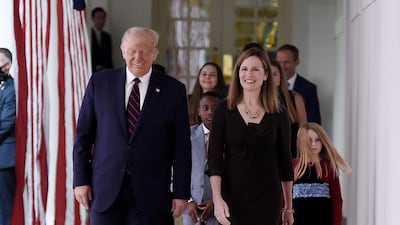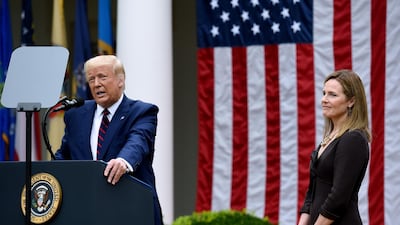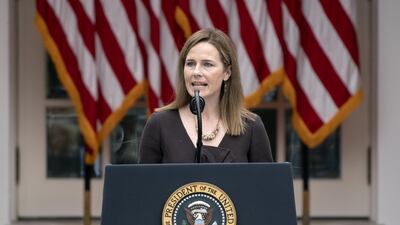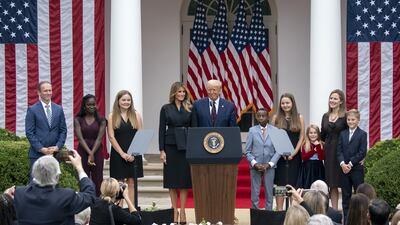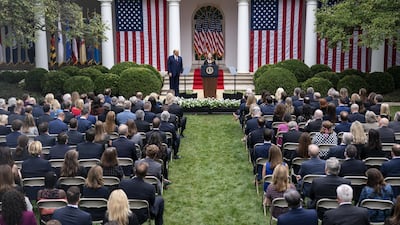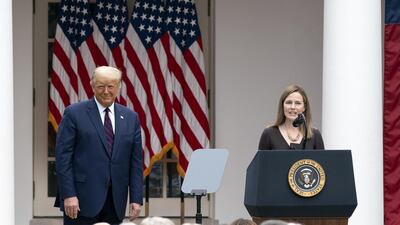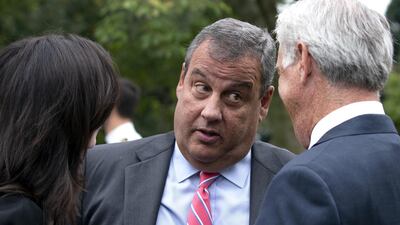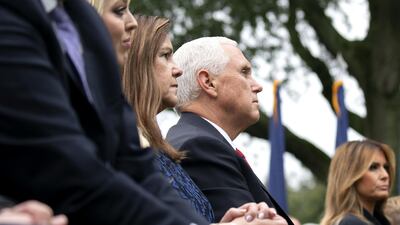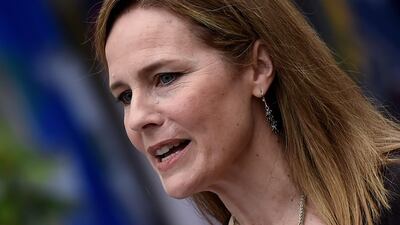US President Donald Trump has nominated conservative federal appeals court judge, Amy Coney Barrett, to fill the US Supreme Court vacancy following the death of Justice Ruth Bader Ginsburg.
At the White House on Saturday, Mr Trump said he thinks Ms Barrett will be confirmed to the Supreme Court before Election Day on November 3.
“I think this will be done before the election,” he said, adding that it would “send a great signal to a lot of people”.
The vacancy became available following the death of Justice Ginsburg, the liberal icon who died on September 18 at age 87.
Ms Barrett, 48, was appointed by Mr Trump to the Chicago-based 7th US Circuit Court of Appeals in 2017 and is known for her conservative religious views.
Supreme Court justices are given lifetime appointments and are therefore able to shape US policy for a generation.
A former clerk to the late Justice Antonin Scalia, Ms Barrett said on Saturday she was “truly humbled” by the nomination and quickly aligned herself with Scalia's conservative approach to the law, saying his “judicial philosophy is mine, too."
While Ms Barret's nomination has sparked constenation among Democratic politicians, she used her own remarks at the White House to try and calm the waters.
She began with an impassioned tribute to Ginsburg, saying, "should I be confirmed, I will be mindful of who came before me."
"The flag of the United States is still flying at half staff in memory of Justice Ruth Bader Ginsburg, to mark the end of a great American life," she said, noting the jurist's pioneering success in law. "She not only broke glass ceilings, she smashed them."
Ms Barrett also gave a taste of what will be her presentation to the Senate, describing her conservative values as a judge.
"A judge must apply the law as written. Judges are not policymakers," she said.
Mr Trump's nominee would give conservatives a commanding 6-3 majority on the court at a time of intense political divisions in the United States.
Ms Barrett has been viewed as a frontrunner throughout, along with fellow federal appeals court judge Barbara Lagoa.
"She was the plan all along. She's the most distinguished and qualified by traditional measures. She has the strongest support among the legal conservatives who have dedicated their lives to the court. She will contribute most to the court's jurisprudence in the years and decades to come," a former senior administration official familiar with the process told CNN.
Mr Trump's nominee has what appears to be a clear path to Senate confirmation before the November 3 presidential election, with Republicans holding a 53-47 majority in the chamber and only two senators in his party indicating opposition to moving forward with the process.
However, Democrats have objected to the Senate acting on Mr Trump's nominee in light of the decision by Republicans in the chamber in 2016 to refuse to consider Democratic President Barack Obama's nominee to replace Scalia after he died during an election year.
Mr Trump has made two previous Supreme Court appointments: Neil Gorsuch in 2017 and Brett Kavanaugh in 2018.
Justice Ginsburg, a champion of gender equality and various liberal causes, on Friday became the first woman and first Jewish person to lie in state in the US Capitol.
Democratic presidential candidate Joe Biden attended the ceremony a day after Mr Trump, a Republican, was greeted with jeers and boos by a nearby crowd as he visited Justice Ginsburg's flag-draped coffin outside the Supreme Court building.
Meanwhile, on the campaign trail, Mr Trump attended back-to-back events Friday in battleground states - a frenetic pace in contrast with the more sedate approach of Democratic rival Mr Biden.
Despite trailing in polls to his Democratic rival, the president mocked Mr Biden for a lower-energy campaign, saying Biden was "staying in again today."
"This guy never goes out. It's terrible huh?" he told a black economic empowerment event in Atlanta, where few people wore masks and social distancing was non-existent.
